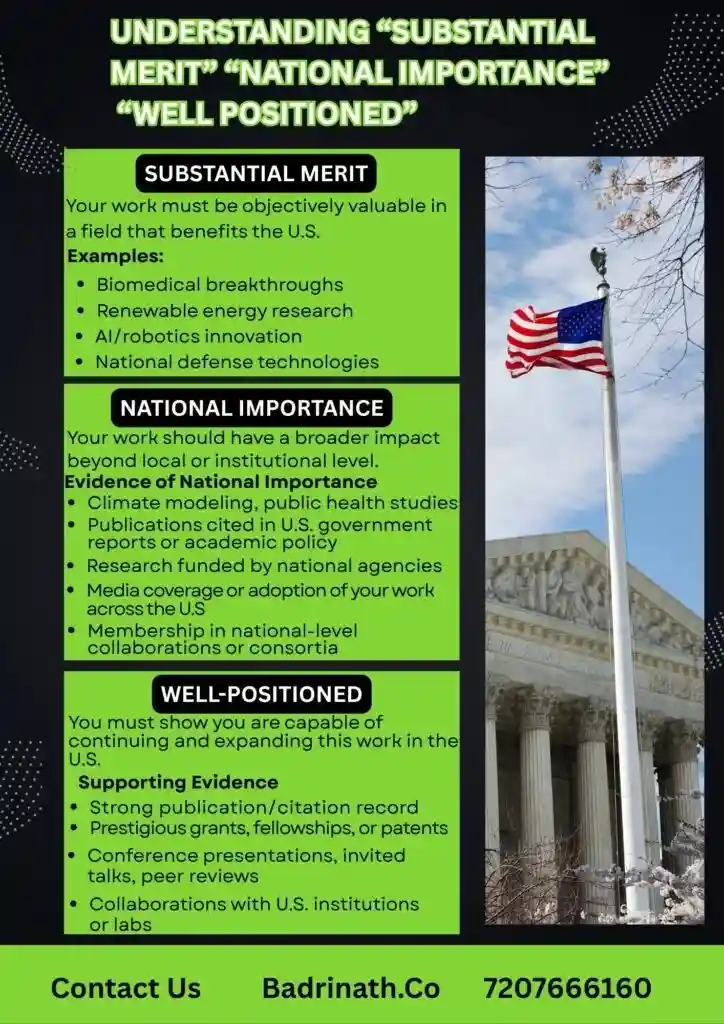Introduction
In the highly competitive landscape of research funding and academic evaluation, understanding the criteria by which proposals and projects are judged is crucial for success. Three key concepts frequently appear in evaluation frameworks across various funding agencies and academic institutions: “Substantial Merit,” “National Importance,” and “Well Positioned.” These terms represent fundamental aspects of research quality and relevance that reviewers and funding bodies consider when making decisions about which projects to support or recognize.

Substantial Merit
Definition and Core Concepts
“Substantial Merit” describes the inherent value, significance, and rigor of the research. This criterion evaluates whether the research demonstrates excellence in its conception, methodology, and potential contributions to its field. Research with substantial merit advances knowledge in meaningful ways rather than making only incremental or minor contributions.
Key Components of Substantial Merit
- Intellectual Significance: The research addresses important questions, challenges existing paradigms, or explores innovative directions that could lead to new understanding or breakthroughs.
- Methodological Rigor: The research employs appropriate, well-designed, and carefully executed methodologies that can produce reliable and valid results.
- Originality and Innovation: The research presents novel approaches, concepts, or techniques rather than simply reproducing or slightly extending existing work.
- Theoretical Foundation: The research is grounded in relevant theoretical frameworks and contributes to theoretical advancement.
- Potential for Impact: The research has the capacity to significantly influence thinking, practice, or future research in its field.
National Importance
Definition and Core Concepts
“National Importance” evaluates how the research aligns with and contributes to priorities, challenges, and opportunities at the national level. This criterion assesses whether the research addresses issues of significance beyond its immediate academic domain to contribute to broader societal, economic, security, or strategic objectives.
Key Dimensions of National Importance
- Alignment with National Priorities: The research addresses challenges or opportunities identified in national research strategies, policy frameworks, or roadmaps.
- Economic Impact: The research has potential to create economic benefits through innovation, improved productivity, new industries, or enhanced competitiveness.
- Societal Benefits: The research addresses important social challenges, improves quality of life, or contributes to social cohesion and wellbeing.
- Environmental Sustainability: The research contributes to environmental protection, resource management, or climate change mitigation and adaptation.
- Health and Wellness: The research advances understanding or solutions related to national health priorities, disease prevention, or healthcare improvement.
- Security and Resilience: The research enhances national security, critical infrastructure protection, or resilience against various threats.
- International Standing: The research strengthens the nation’s international reputation, influence, or competitiveness in key areas.
Well Positioned
Definition and Core Concepts
Generally, “Well Positioned” evaluates the feasibility and likelihood of success based on the capabilities, resources, and circumstances of the research team and their environment. This criterion assesses whether the researchers have what they need to execute the proposed work effectively and achieve their stated objectives.
Elements of Being Well Positioned
- Researcher Qualifications: The researchers possess the necessary expertise, skills, experience, and track record to successfully conduct the proposed research.
- Institutional Support: The host institution provides appropriate infrastructure, resources, and administrative support for the research.
- Access to Facilities and Equipment: The researchers have access to specialized facilities, equipment, data, or materials needed for the research.
- Collaborative Networks: The researchers have established productive collaborations or partnerships that enhance their capabilities or extend their reach.
- Risk Management: The research plan acknowledges potential challenges and includes strategies to address them.
- Time and Resource Allocation: The proposed timelines, budgets, and resource allocations are realistic and sufficient for the proposed activities.
- Ethical and Regulatory Compliance: The researchers demonstrate awareness of and plans for addressing relevant ethical considerations and regulatory requirements.
- Knowledge Translation Capacity: The researchers have appropriate strategies and connections to ensure research outcomes reach relevant stakeholders.
Interrelationships Among the Criteria
These three criteria—Substantial Merit, National Importance, and Well Positioned—function as complementary dimensions of research evaluation. A project may excel in one area but fall short in others:
- Research with substantial merit but limited national importance might represent excellent science that primarily advances specialized knowledge without broader societal benefits.
- Research addressing nationally important issues but lacking substantial merit might identify relevant problems but propose approaches unlikely to yield significant advances.
- Research with both substantial merit and national importance might still fail if the team is not well positioned to execute it successfully.
The strongest research proposals and projects demonstrate strength across all three dimensions, presenting intellectually significant work on nationally important issues by teams well positioned to succeed.
Practical Applications
Understanding these criteria can help researchers:
Position their work strategically within broader contexts of academic and national significance
Design research programs that address significant questions while aligning with national priorities
Assemble appropriate teams and resources before submitting proposals
Articulate the value of their work effectively in proposals and reports
Identify and address potential weaknesses in their research plans

Conclusion
Finally “Substantial Merit,” “National Importance,” and “Well Positioned” represent essential dimensions of research quality and relevance that transcend specific disciplines or funding programs. By understanding and addressing these criteria, researchers can develop stronger proposals, conduct more impactful research, and more effectively contribute to both knowledge advancement and national objectives.
SEO Keywords
- National Interest Waiver USCIS
- EB-2 NIW for researchers
- Substantial merit definition USCIS
- National importance EB-2
- Well positioned USCIS criteria
- EB-2 green card for PhD
- Self-petition green card research
- EB-2 visa for academics
- NIW for STEM professionals
- EB-2 eligibility for scientists
Read More About the Topic
External Links
Understanding the EB-2 NIW Visa Process
The National Interest Waiver- a Green Card option for Skilled Workers. Who Qualifies?







